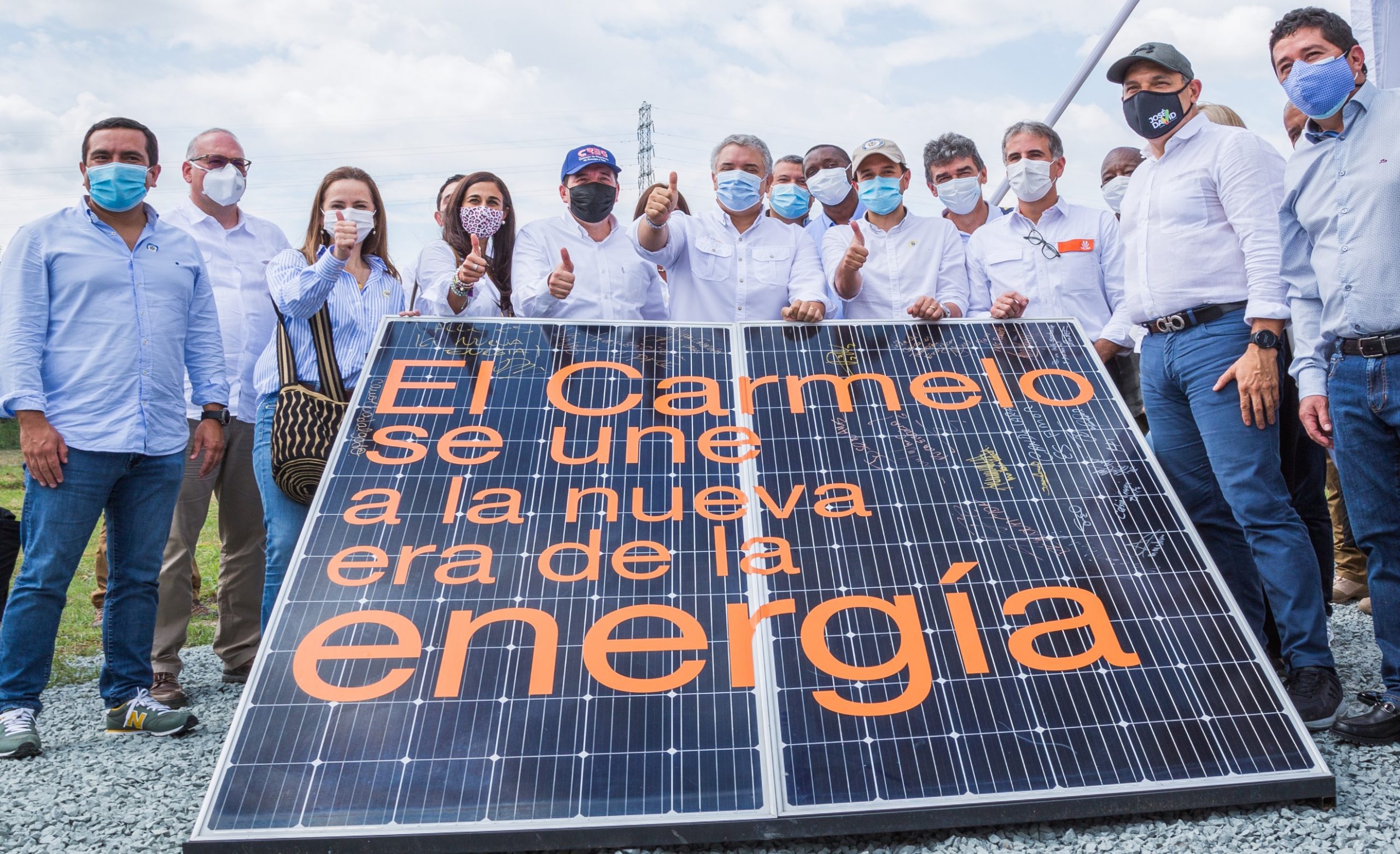- The President took advantage of this scenario to give presidential sanction to the Energy Transition Law.
- Celsia made an investment of COP $38 billion in an alliance with Cubico Sustainable Investment, in the construction of the solar farm. The resources come from the issuance of Green Bonds.
- Each megawatt of energy generated shall avoid the emission of 640 tons of CO2 a year, which is equivalent to planting 106,136 trees.
- 7 MW of energy generated by Celsia Solar El Carmelo goes to the National Electrical Grid (SIN) and 6.1 MW for the Pollos Bucanero Plant, the second largest chicken producer in the country. With this energy, they meet 39.3% of their demand and process more than 55 million kilos of chicken a year.
Celsia, a Grupo Argos energy company, commissioned their fourth large-scale solar energy project in Colombia. This is Celsia Solar El Carmelo, with 9.8 MW of capacity, which joins those developed in Santa Rosa de Lima, Bolívar; El Espinal, Tolima; and Yumbo, Valle de Cauca.
With this new solar plant in the municipality of Candelaria, Valle del Cauca, the company reaches 37.56 MW of installed capacity via solar farms, to which another 21 MW are added from solar floors and roofs that are already in operation in different departments of the national territory.
“The plunge towards an energy revolution is now a fact. In Colombia, we currently have some installed projects and some to be installed (by August 2022) totaling 2,500 MB of non-conventional renewable energies. This means going from less than 0.3% at our renewable-energy parent company to more than 14% and this figure will keep growing. Therefore, I would like to recognize the private sector and companies like Celsia who think big, create jobs, generate added value and opt for energy transformation,” claimed the President of the Republic, Iván Duque Márquez, during the tour he took of this solar farm in the company of various members of his cabinet, the Governor of Valle del Cauca, Claudia Luz Roldán; and the Mayor of Candelaria, Jorge Eliécer Ramírez Mosquera.
This scenario was also chosen by the National Government for the presidential sanction of the Energy Transition Law, which aims at closing gaps, achieving equality, sustainable mobility, and the improvement of incentives for the generation of non-conventional renewable energy in Colombia, including the extension of tax benefits.
“From Celsia, we will continue to contribute more clean energy to Colombia, in some cases by directly supplying it on the National Electrical Grid, and in others by being allies to our business clients, by contributing to their competitiveness,” said Luis Felipe Vélez, Commercial Leader of Celsia. He added: “Celsia Solar EL Caramelo is also a contribution to the department’s economic reactivation, as it provided job opportunities for 182 people, mostly local labor, at the peak of its construction. These employees are residents of the area and 23% are women, who carry out different tasks, such as assembling modules and securing of structures to hold more than 33,000 solar panels in 13.13 hectares.
The farm was built in the middle of the pandemic and is now giving energy to the Pollos Bucanero plant, property of Cargill (6.1 MW) and the surplus to the National Electrical Grid (3.7 MW)
Carlos Roque, Operations Manager of Cargill for Colombia, indicated that “the commissioning of this project in alliance with Celsia is a very significant advance in our sustainability strategy. The renewable energy that we receive will support our production plant located in Villagorgona and, in this way, we will advance in the goal of reducing our greenhouse gases by 10%, contributing to mitigating the effects of climate change.”
In addition to the four large-scale farms that it has operating in Colombia, Celsia has a fifth farm in the Province of Coclé, Panama, and a sixth farm in Comayagua, Honduras. Likewise, it has more than 15 solar farms under evaluation, which they plan to develop with Cubico Sustainable Investment, an international investment fund that has believed in Colombia. They shall be developed in different regions of the country an shall add around 650 MW, which shall enter into commercial operation in the next 18 to 24 months and which represent investments for around COP $1.3 trillion, of which COP $420 billion shall be funded with resources from the Green Bonds program.
Information of interest
Currently, Cargill, pays a lower value per kilowatt of solar energy than that of conventional energy. This farm contributes to its sustainability indicators and reputation as a company that works to reduce environmental impact by using renewable energy.
Solar energy mitigates global warming, reduces the use of fossil fuels, and contributes to sustainable development. In addition, solar panels do not increase temperature nor do they affect health.







